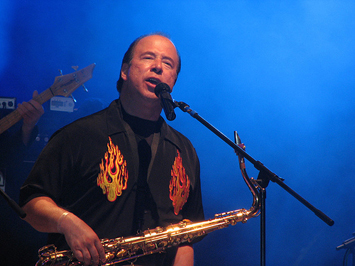By Ralph Greco, Jr.
You couldn’t talk to a cooler cat than Emilio Castillo, the leader, producer, songwriter and second tenor sax of the legendary Tower of Power. Along with Stephen “Doc” Kupka, Castillo created this unique American soul horn band, penning hits with his partner like “What Is Hip?,” “Only So Much Oil” and many others. Of course, TOP has also gained a reputation for backing everyone from Aerosmith to Huey Lewis. It seems that when anyone thinks about adding a horn section to a song, Tower of Power gets the call. Celebrating their 40th anniversary, the demand for TOP’s soulful carnage continues. I had the honor of speaking with Emilio Castillo about the new Tower of Power CD Great American Soulbook, as well the band’s illustrious legacy and their busier-than-ever schedule. The man gave freely of his time and insights.
Congratulations on the new album and the Number 3 spot on the Billboards chart. Why an album full of covers?
For a contemporary jazz band, we were pretty committed that we didn’t want to do it. Our manager came to us and said, “Since it’s our 40 year anniversary, I think it might be good to do something special. You’ve done all original albums. I think maybe you should give the fans something different.”
So this wasn’t the band’s initial idea?
We don’t chase trends — we set them! “Why would we want to do that?” we thought. It just wasn’t something we were into.
But the idea grew on you?
Well, we figured we’d try it, but if we’re getting bogged down we’d scrap it and get down to making an original record. We started recording it, and it was tough going at first, but about a third of the way into it, I started to put my thing on it, and it started to shape. Then we took a whole new attitude to it.
Can you tell me how you guys went about deciding on these specific songs?
There’s basically two schools of thought when you’re gonna do this kind of thing. What we used to do when we were playing around town as this little soul band — before we were Tower of Power — was go out and play all the songs the other bands weren’t playing. We’d find the obscure tracks by the same artists, the tracks we really dug. So my thinking with this album was, let’s picks songs nobody would pick. But there’s the other school of thought that said, no man, we gotta do the hits.
Well you certainly seemed to have balanced it out here.
For example, something like “You Met Your Match” was always something we wanted to do. It wasn’t even a hit for Stevie Wonder, but still it was one of the most exciting vocal performances I ever heard. And I knew my singer (Larry Braggs) could do it justice. “Loveland” (is another one) I wanted to do. Several of my members always dug that tune.
I see George Duke produced some songs on the CD. Tell me about his involvement.
I’d done four tracks and it kinda felt like we were dragging our heels. At the time, it was getting a bit frustrating because I didn’t do a lot of changing in the rhythm sections from the original recordings, but our versions still sounded good. But you know, we didn’t take any left turns rhythmically. I figured we’d just put our stamp on it with the horns. So I figured, let’s bring in another producer to hit a couple of the tracks. Tell him right up front whatever songs we choose, to go left with them rhythmically. That’s what George did.
And, of course, because it was George Duke, there were no conflicts with having another producer on the session?
Exactly. Lots of producers are really not much more than engineers, but not George. He’s such a great musician and great producer; he knew what we wanted. And he’s a great guy to work with.
You got some heavy vocal guests here. How did you come to work with Tom Jones?
I was frankly amazed we got him. The guy’s an icon, but he’s been a Tower of Power fan for years — we had (even) done a tour with him. It took a long time to get a response out of him though. Doc and I partied with Mark Woodward (Tom Jones’ son and manager) in Hawaii years ago, and all he did was gush over Tower of Power. Our old drummer plays with Tom. I finally got in touch with Mark through all these connections and told him we had been trying to get in touch for months. He apologized and said it had just been really hectic lately, but that Tom would love to do it and work with us. (Jones sings Sam and Dave’s “I Thank You” on Great American Soulbook)
And Huey Lewis?
We had gotten Tom Jones, then Joss Stone came in and we arranged for Sam Moore. Huey had a really busy schedule, but I had toured with him in the 80s, so we know him well. He said he only had like a two-week window because he had to go to Montana to be with his kid, so he said, “Send the track to Montana, there’s a studio there I can use.” But in that time, he got sick, real sick, so he said, “Man I don’t know what to do, I’m sicker than I’ve ever been! I know you got to get it out.” But I told him we were in no real hurry. So he did it when he was well and sent it back.
I love what he did with you guys, I’m not sure I’ve ever heard Huey Lewis sound quite like that.
The interesting thing is that the song (Lewis sings the classic Wilson Pickett hit “634-5789”) isn’t even in his key but it did come out great.
I was reading about your recent anniversary show at the Fillmore. Tell us a little about what that was like.
We had whole bunch of casts members play with us. We also had Sam Moore sing.
That’s coming out on DVD soon, right?
Yeah, I have to go to L.A. next week, hopefully to finish the mixes.
That must have been really special, celebrating 40 years.
When we went through the three days of rehearsal, that’s when it really hit home. People dropped by the rehearsal — merchandising people, lighting guys, old road managers, wives, kids — all week and wow man, you start to realize. You start to see these people, and realize what a blessing it’s been that we have done this for so long. We’re always in the middle — we got blinders on and this is what we do. You’re always just doing it and don’t think too much about how long we have been doing this and how great it’s been.
How has your approach changed with the changes in the record business? It’s obvious that things are drastically different now then when you guys first started out. So how does Tower of Power weather all these changes?
Well for one, I remembered when you lived and died for a record deal. The 80s were a hard time. We couldn’t even record; there was no financing. But we got a record deal in the 90s. We were one of the few older bands who signed a deal with a major label at that time — a seven album deal with Sony. So we recorded with them, put them out, but began to see we really made no money from the record sales. But we were able to travel the world more; our box office price went up. So business was good for us. We went past the millennium, made a management change and decided at that point to start our own record company. We have a great distribution deal with Ryko so that gets the stuff out there.
Is Great American Soulbook the first release on your new TOP label?
Yes. This and a CD called The East Bay Archives Volume 1. That’s a live recording of two shows we did in Boston in 1973 with the classic lineup.
So, basically you’re more in control nowadays.
Right. We’re not at the beck and call of a record company. We pretty much do what we want.
What’s in the immediate future for Tower of Power?
We’re going up to Seattle to play, then we’re doing Korea. This is our second time. Years ago, we played for military bases with Foghat actually, but this time we’re playing a festival in downtown Seoul. Then we go back to Japan. They love us there. We have a fan club over there. They call themselves “The Funk Club” spelled with a “K” (laughs).
Getting through the 80s, having the hits early on, playing behind a whole bunch of people, maintaining such a vibrant live act, seeing such a roster of great players come through — what do you attribute your longevity to? How has Tower of Power survived?
We make the music really selfishly — we make it to please ourselves. That’s why we were reticent to do this cover album. We do what pleases us. Even now, we made it to please ourselves. It makes it easy to go doing something that’s pleasing to do.




















